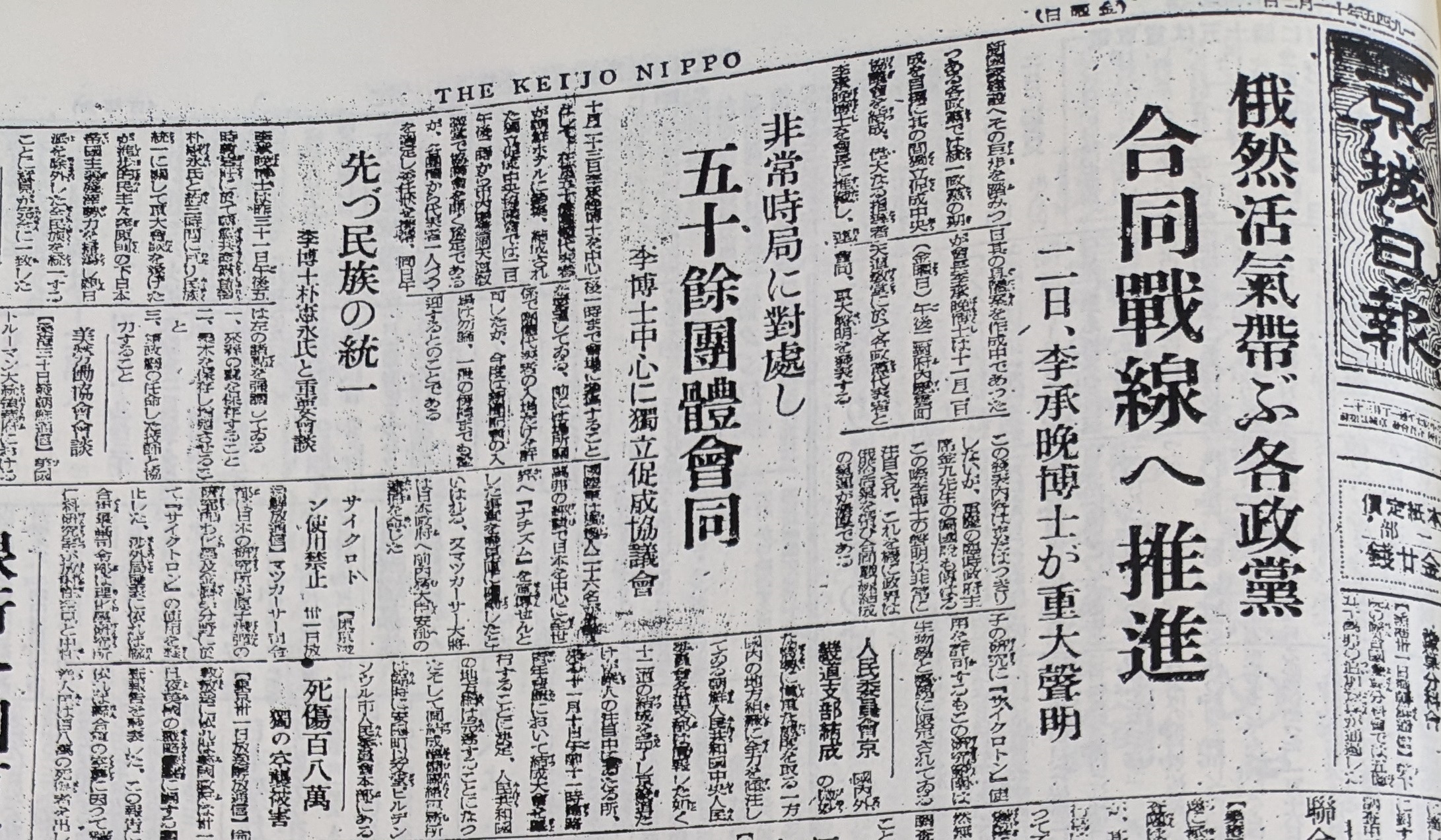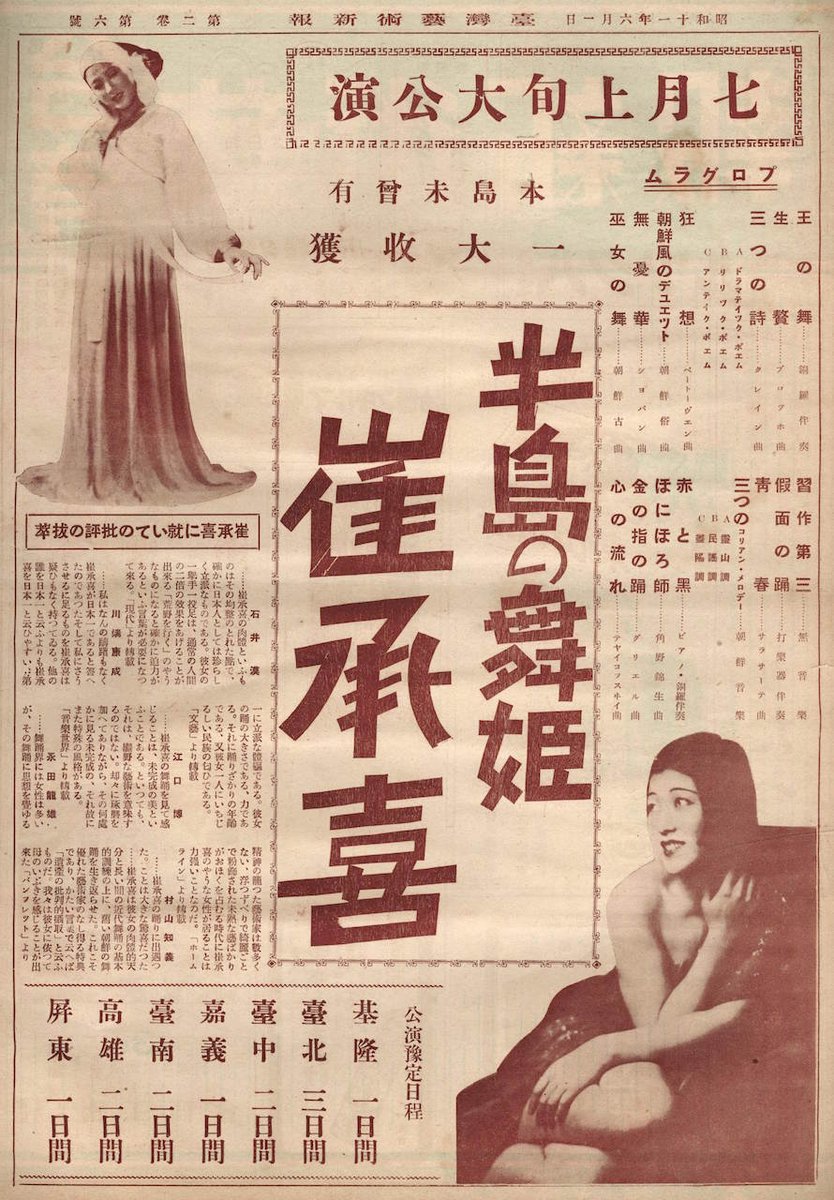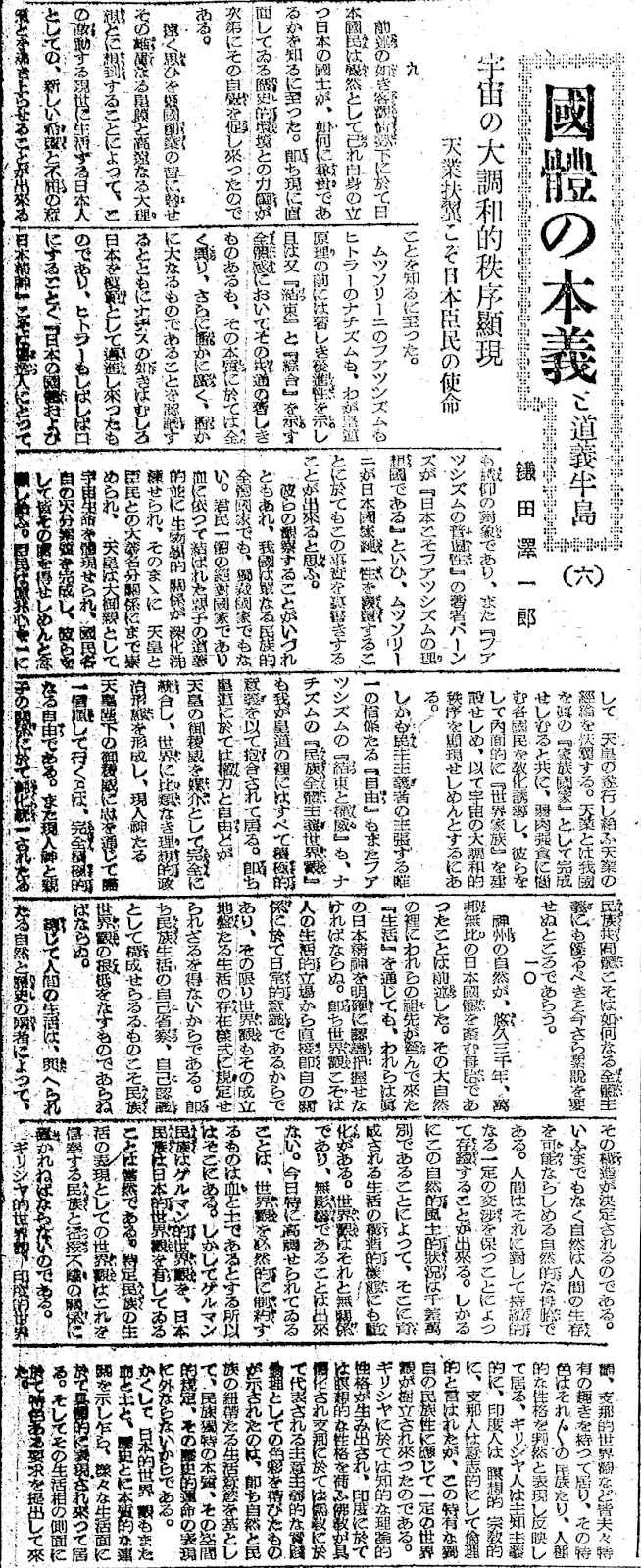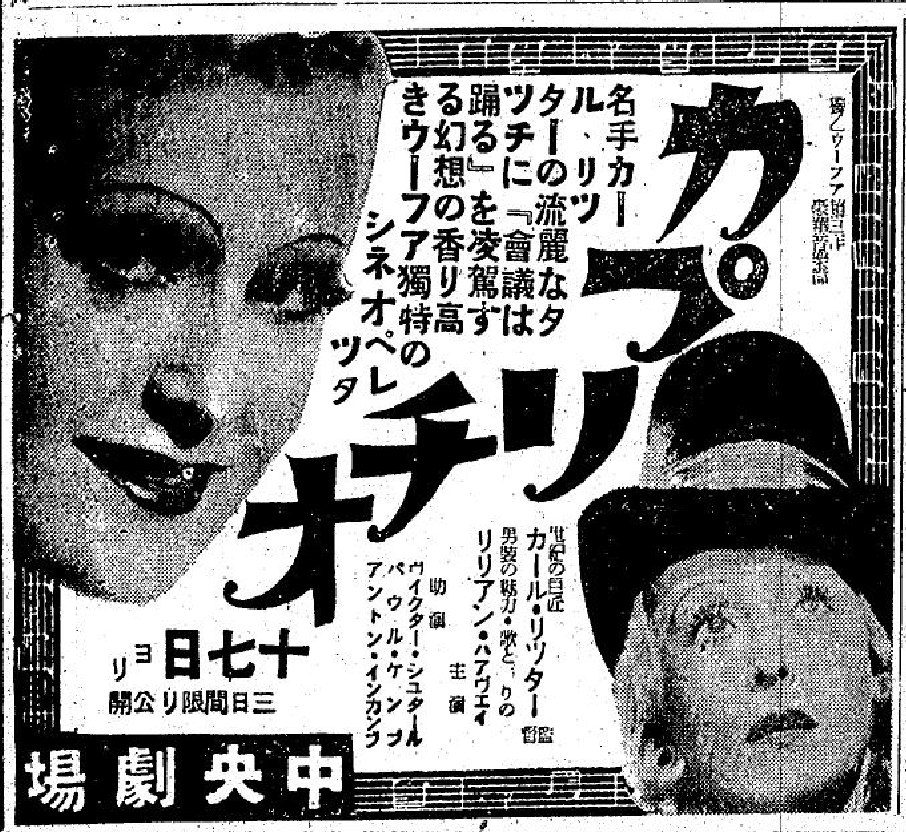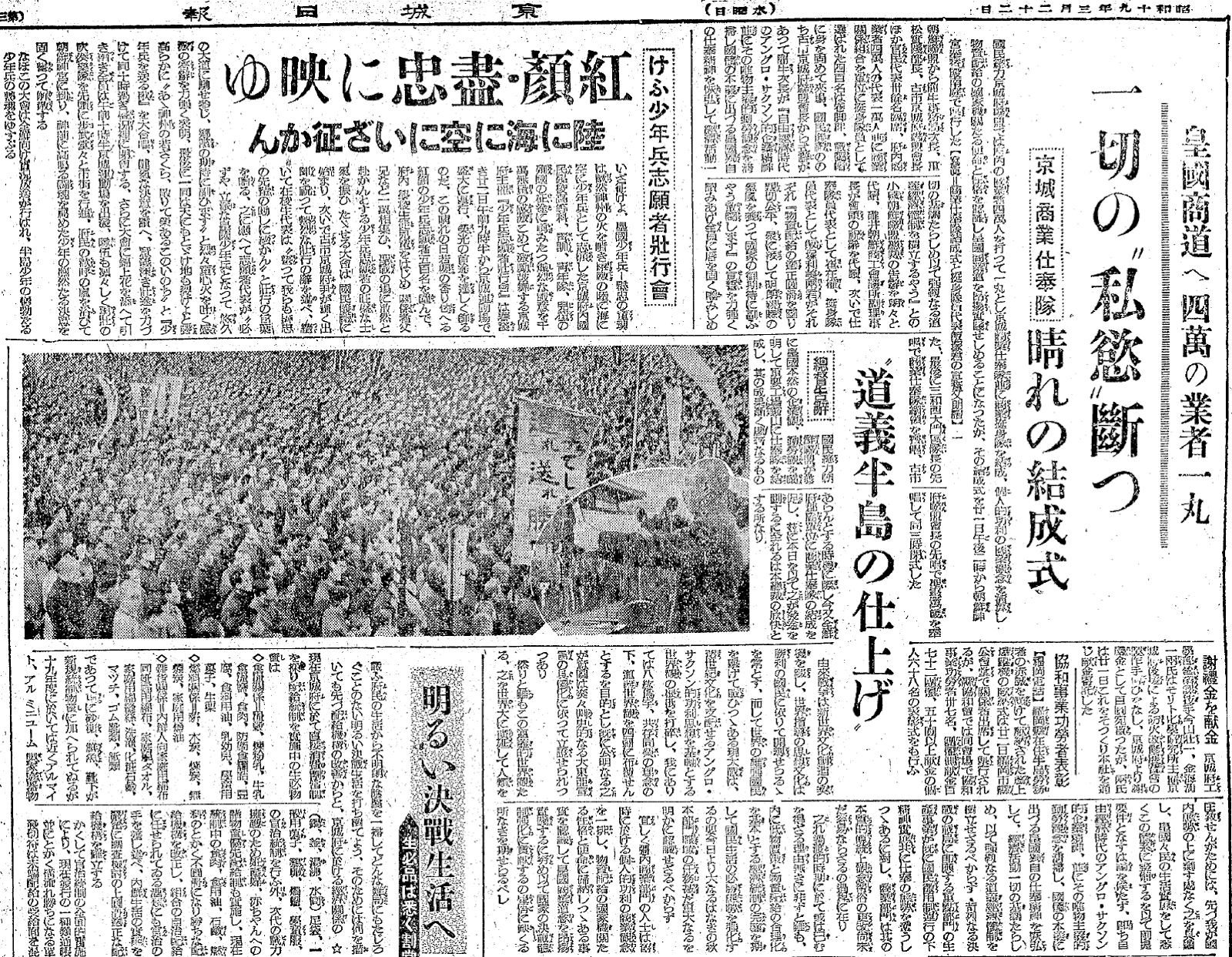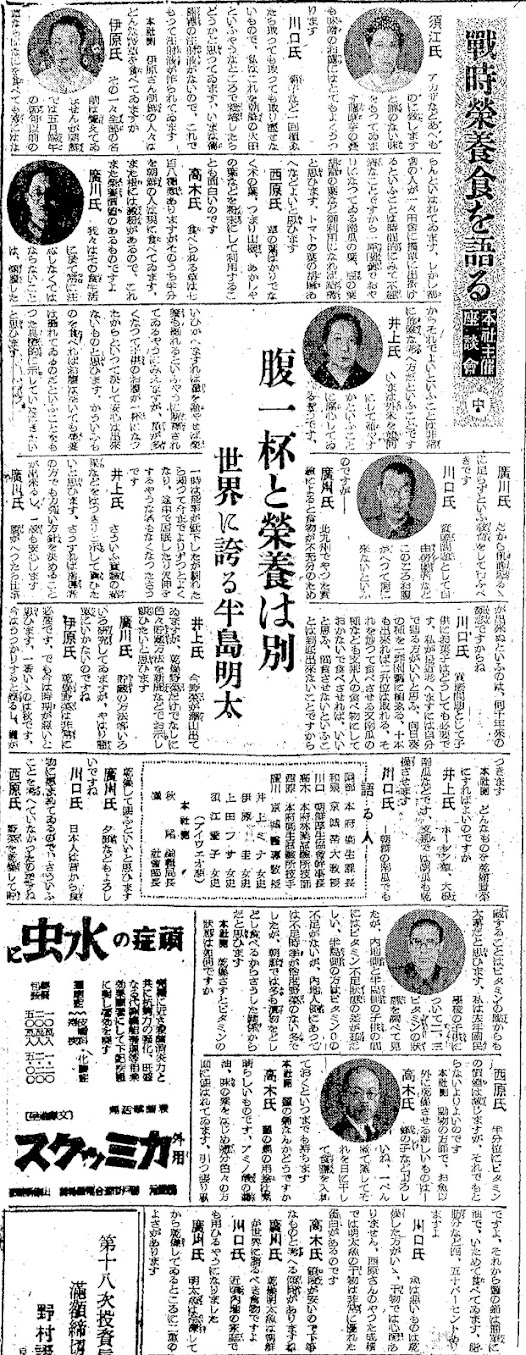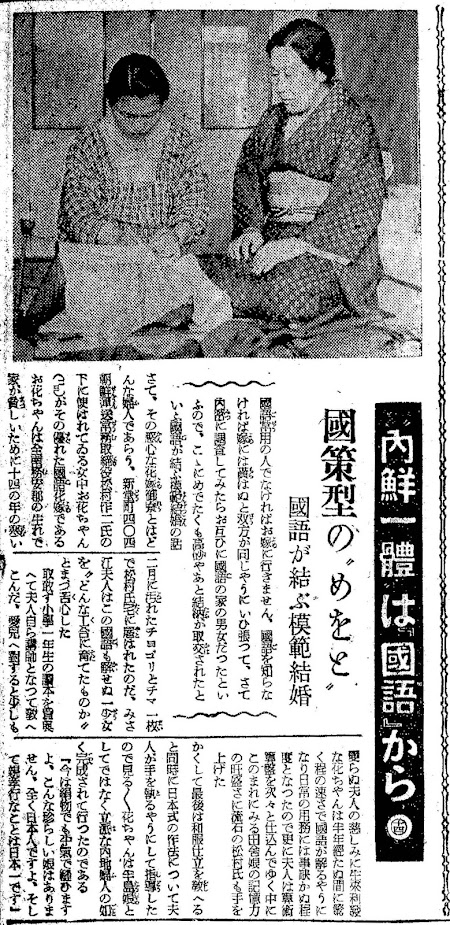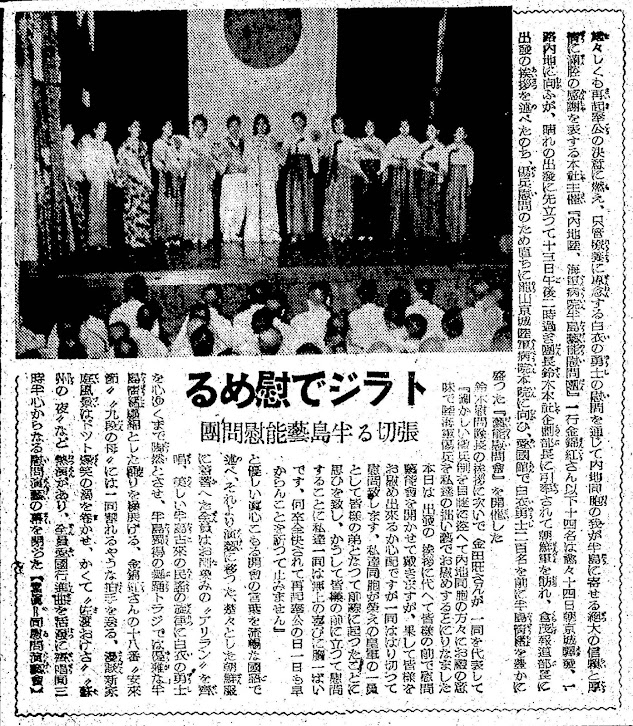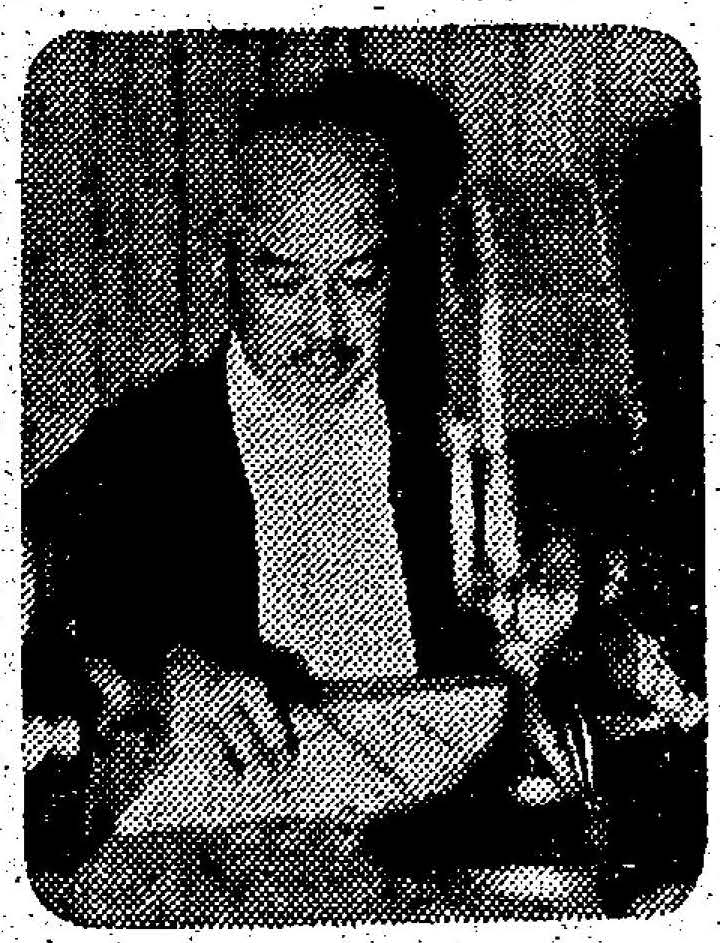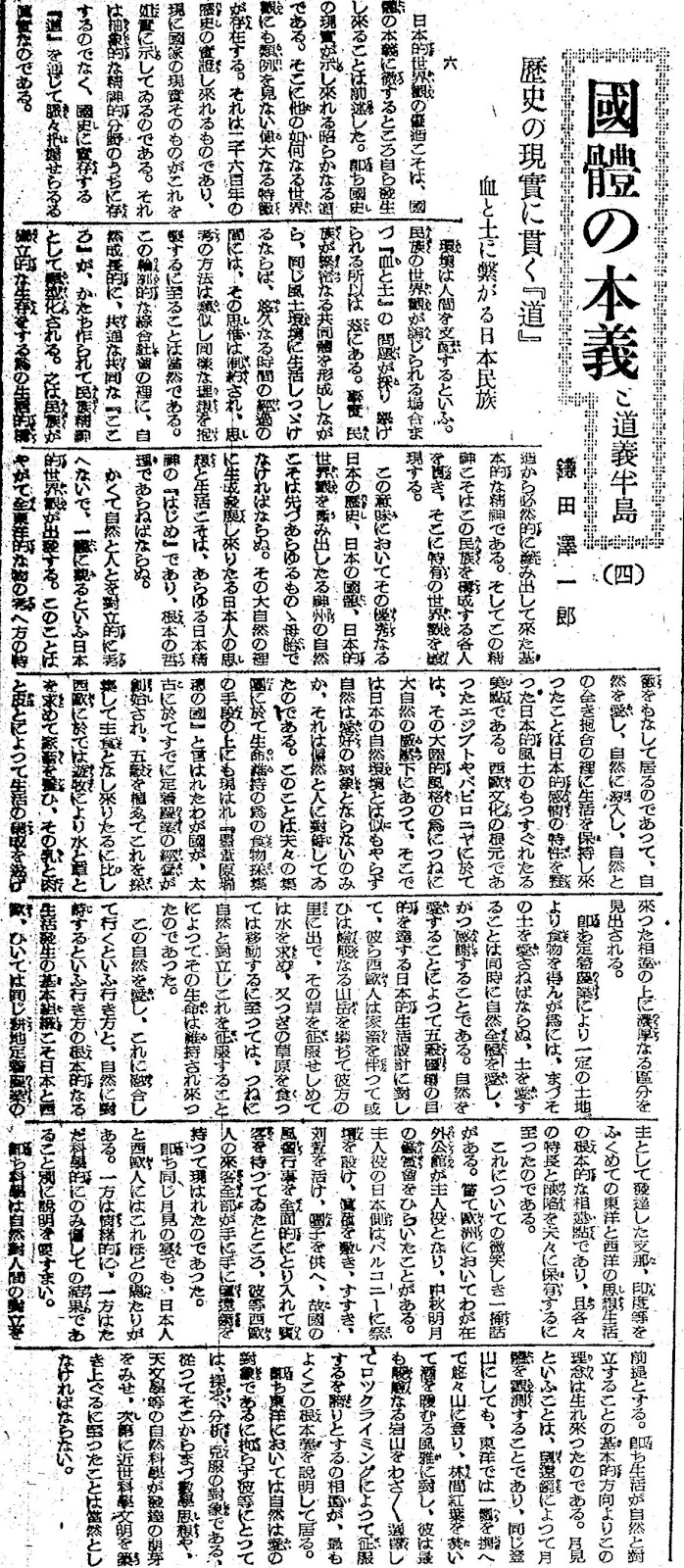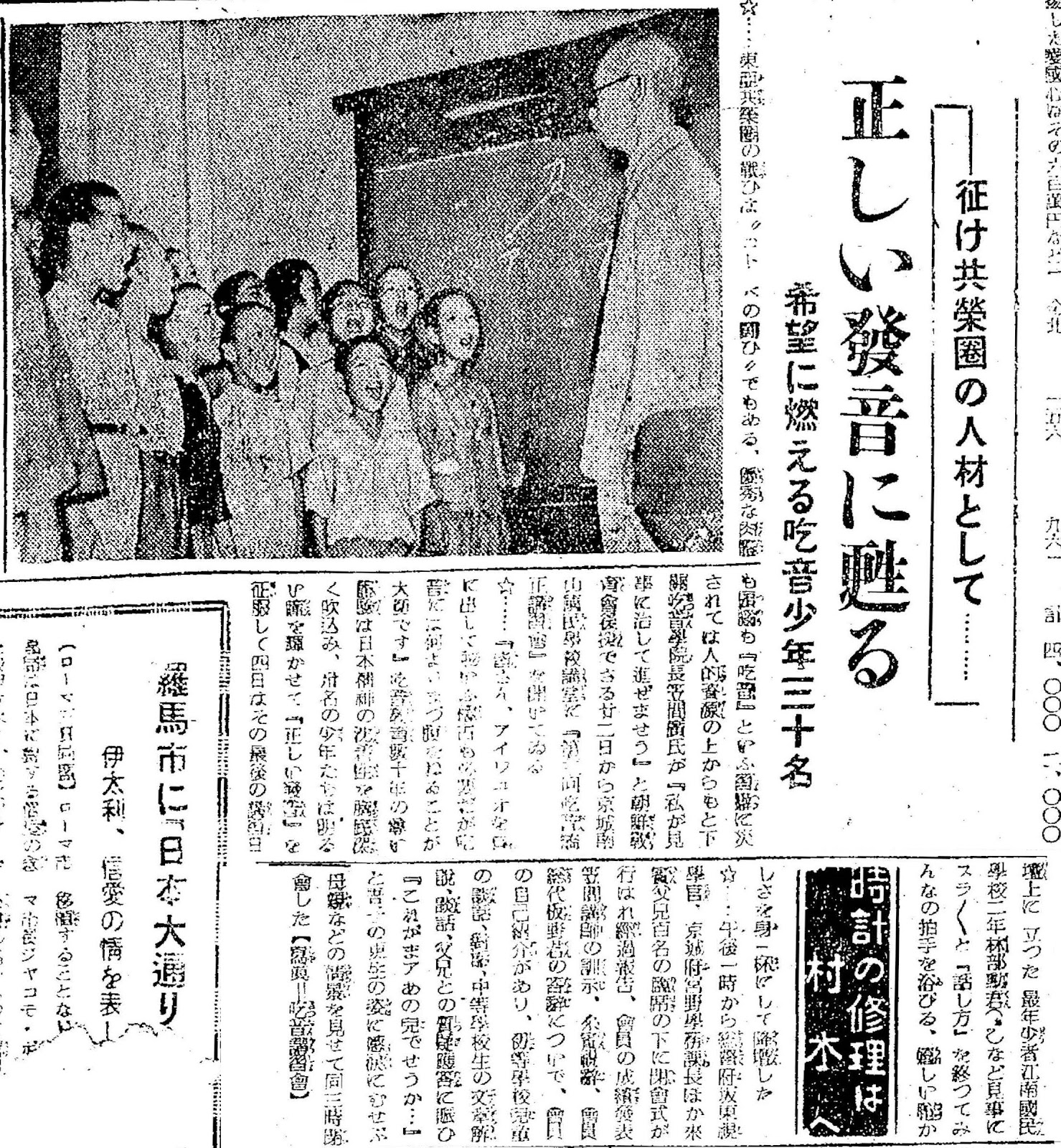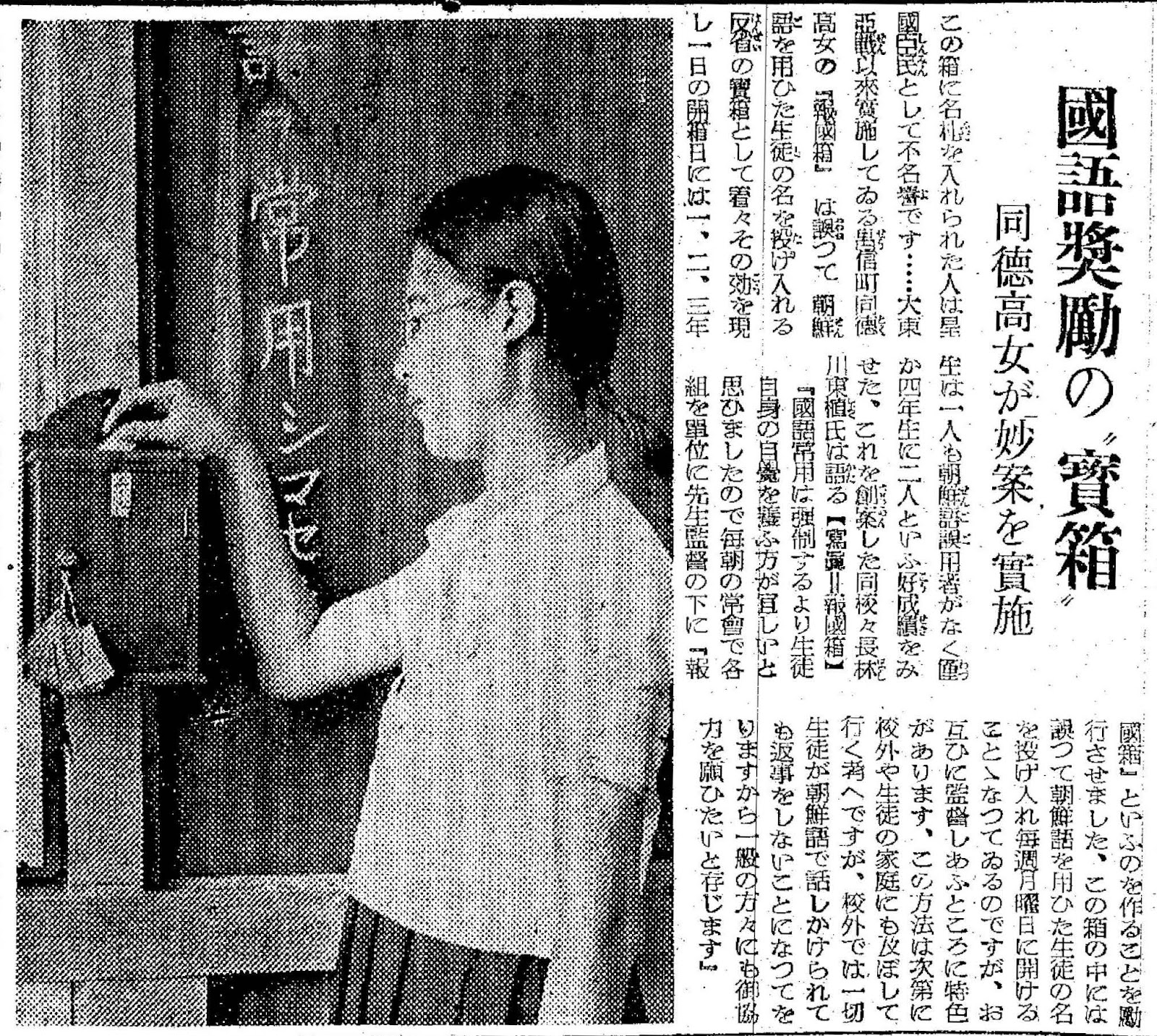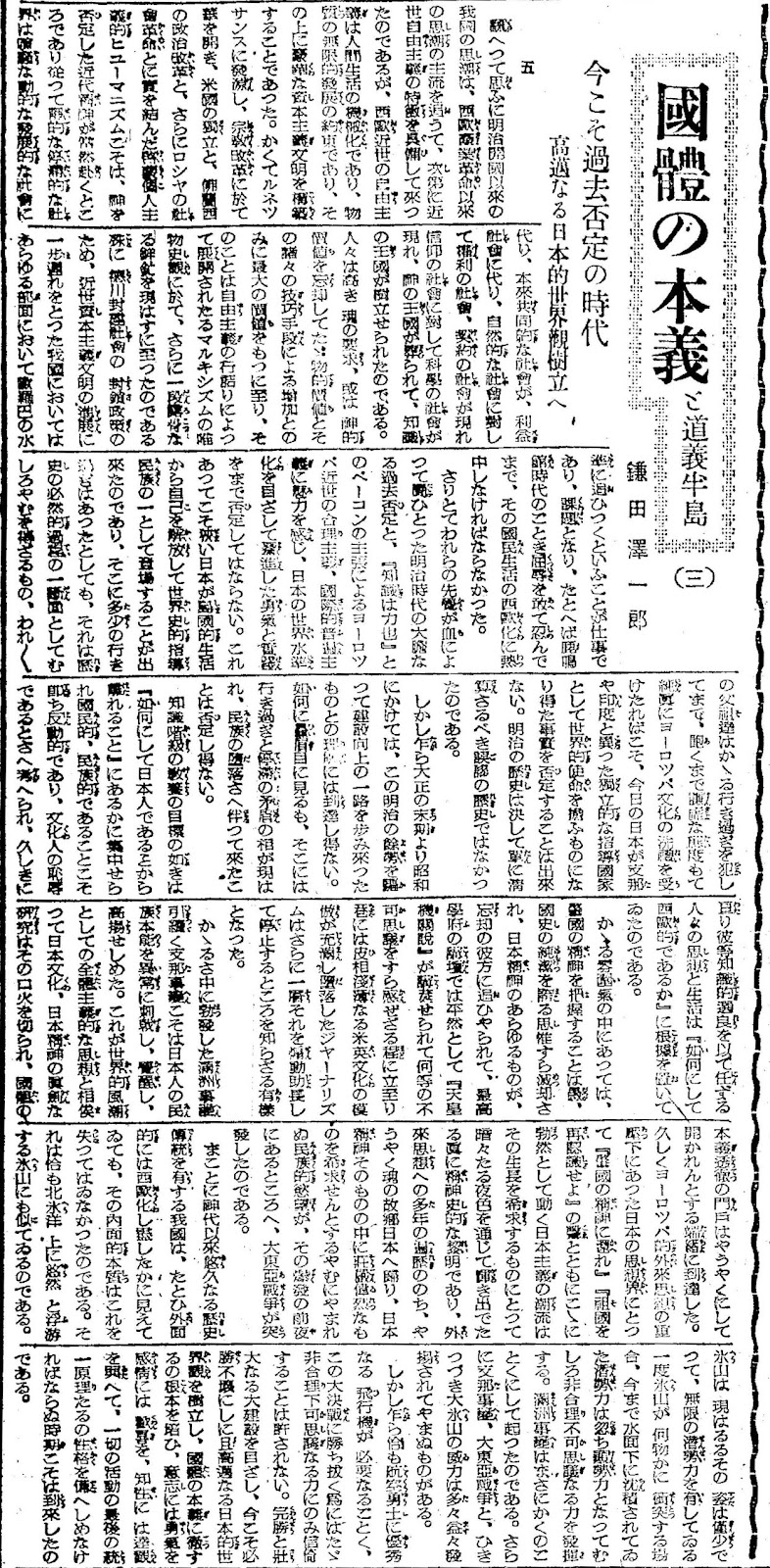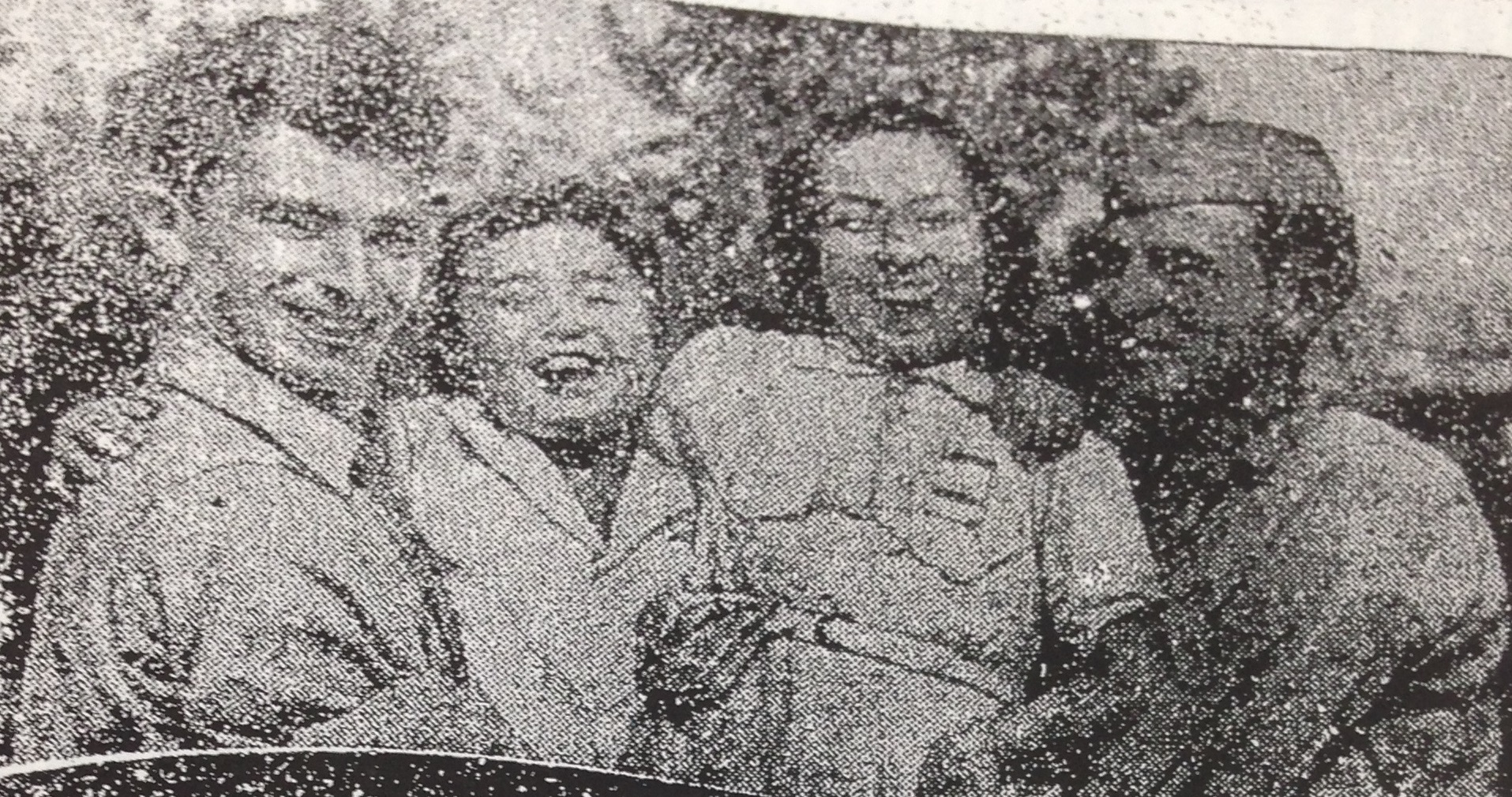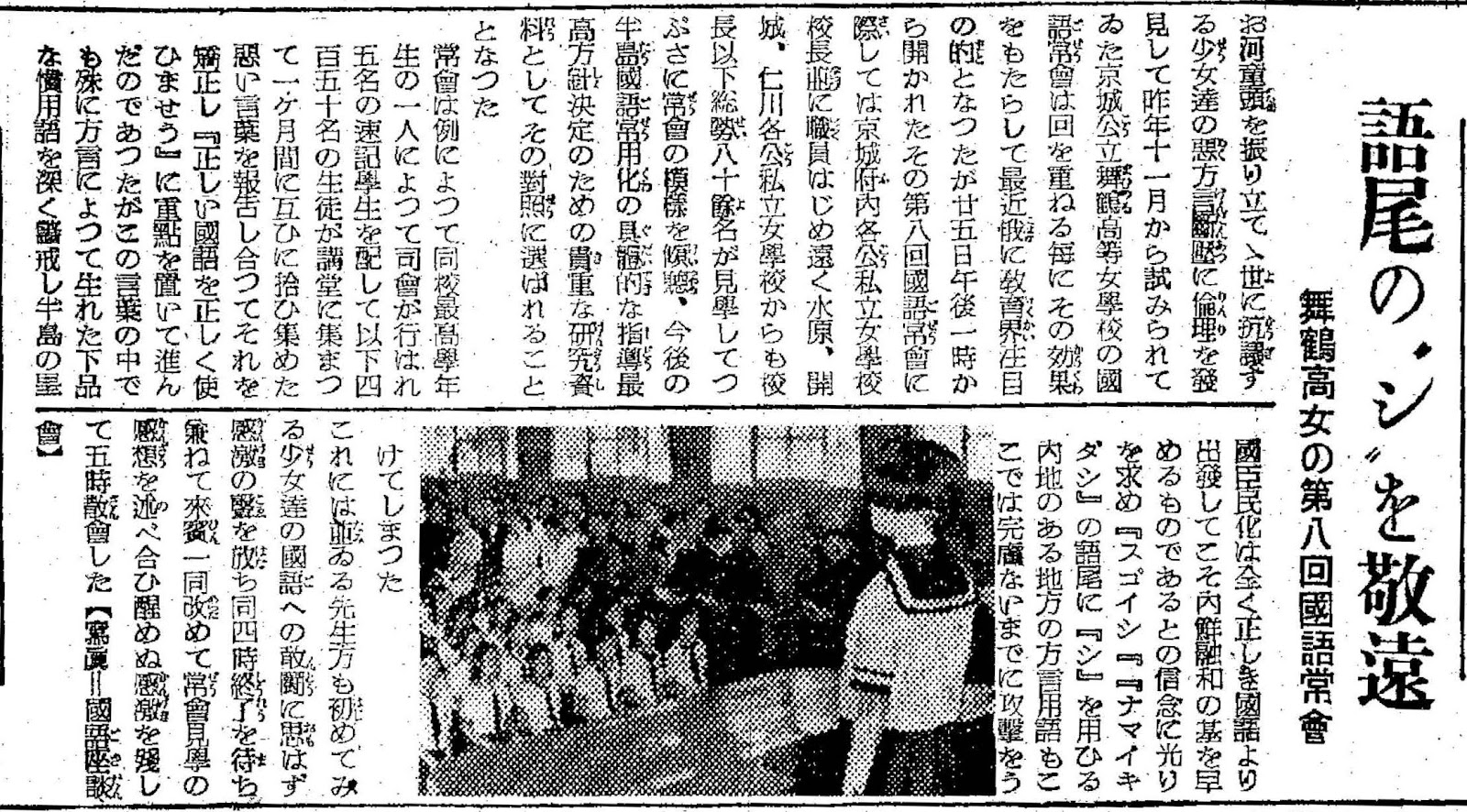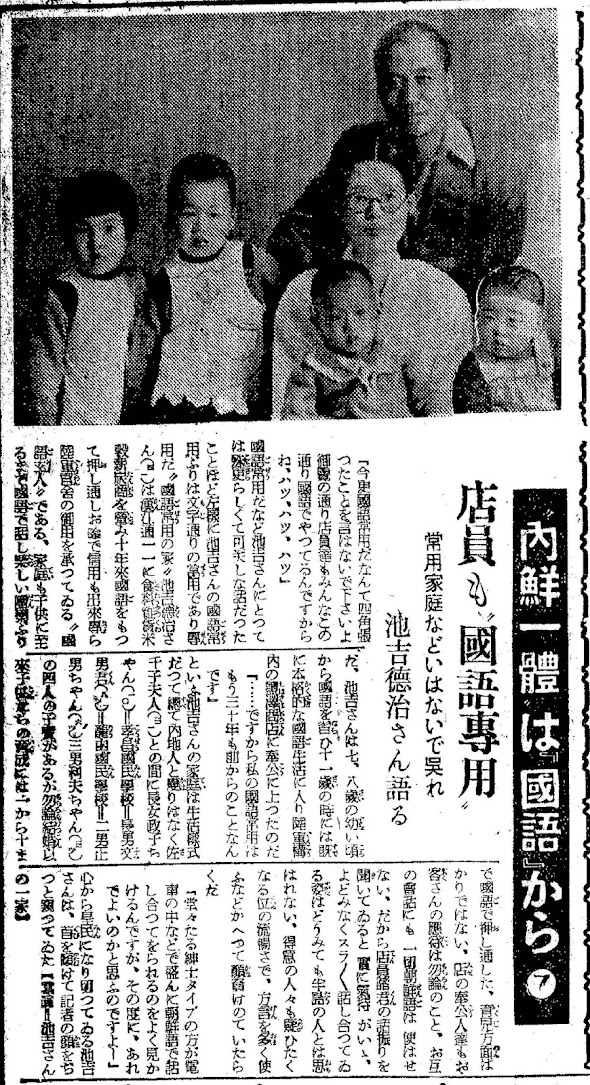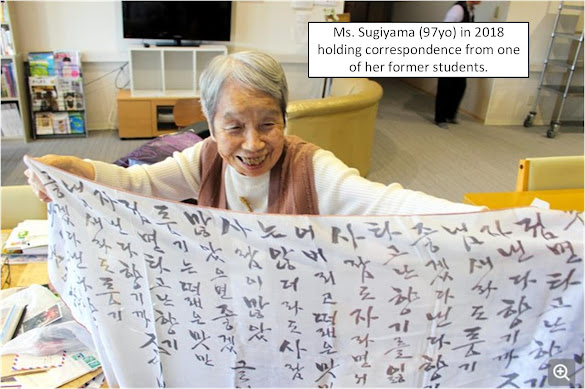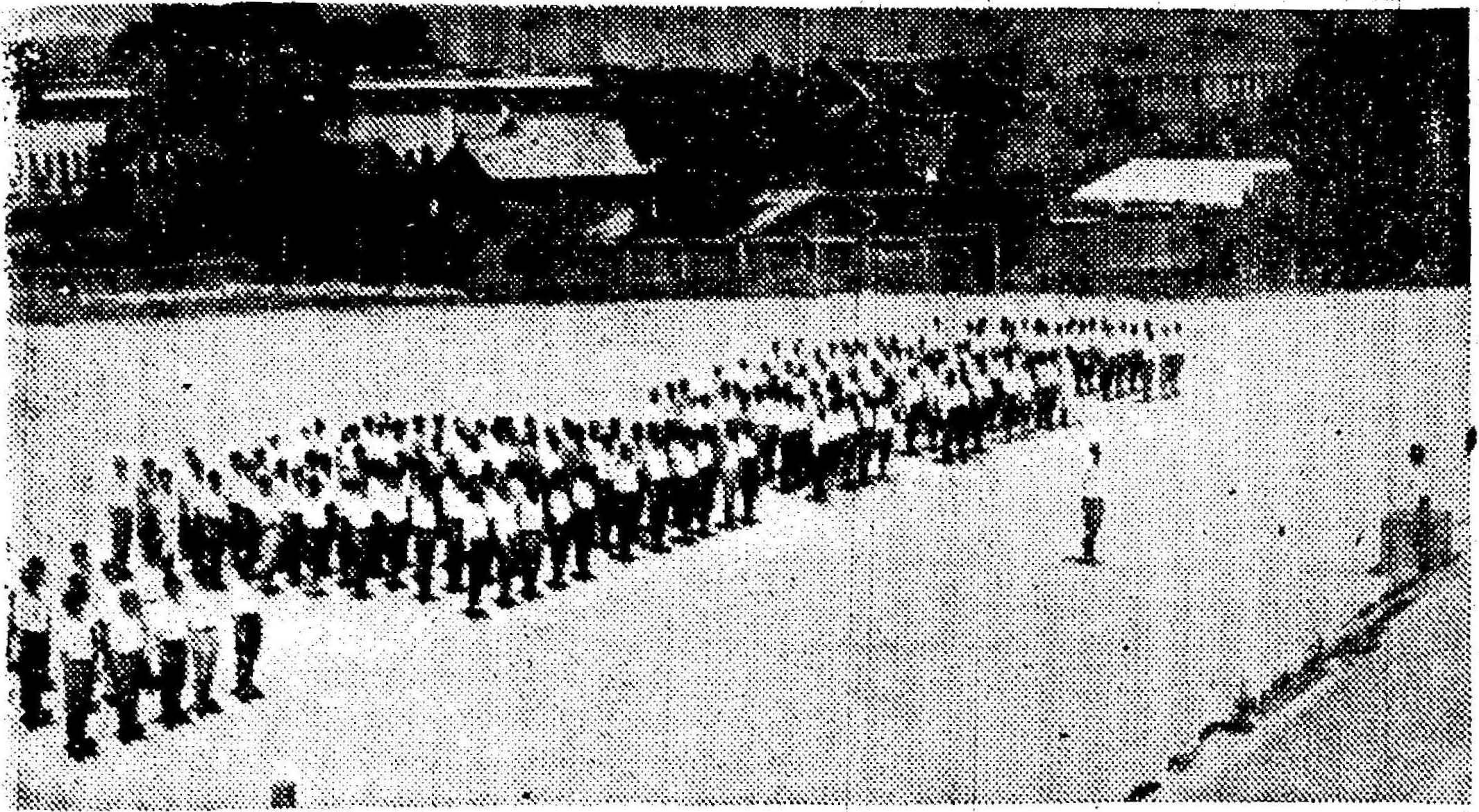
Governor Koiso likened Korea to a disabled body whose brain (regime) could not talk to the limbs (Korean people), so an ‘exclusive use of Japanese’ policy was forced on Koreans, starting with Seoul city employees who were labeled ‘inferior’ and ‘weak-willed’ if they still spoke Korean at work
2023-01-15
280
1656
In 1943, Governor-General Koiso kicked off the new year by intensifying his campaign to further restrict the public spaces in which the Korean language can be used. Apparently, there were still employees in the Seoul prefectural government who spoke Korean at work, but this article from Janauary 1943 indicates that the regime started to crack down on them, so that government employees were no longer allowed to speak Korean at all, either at work or at home. The purported reason for this draconian measure was the “reform of general administration and the simplification of administrative work”. To paraphrase it in the words of Governor-General Koiso, the brain and the limbs had to speak the same language for the body to move in an orderly fashion. This was all part of the “Japanese-Korean unification” policy that was ruthlessly pursued to suppress Korean language, culture, and ethnic identity in Korea, leaving lasting trauma that is still being felt even to this day.
(Translation)
Gyeongseong Ilbo (Keijo Nippo) January 20, 1943
The year of decisive battles, the rush to put things into practice (2) Seoul Edition
Seoul government employees shave their heads and begin to use the Japanese language regularly
Total efforts to simplify administrative work
“The establishment of a Righteous Korea can only be fully realized by training all 24 million people in the various occupational areas to truly adhere to the true meaning of the National Body as Imperial subjects …” were the words of Governor-General Koiso‘s instructions. Every word of his instructions at the opening ceremony of his administration was a fireball that shot into our ears and strained our hearts. Let’s take a look into the “spirit of training” of the Seoul prefectural government employees who are leading the charge on behalf of the 1,000,000 Seoul residents, who have begun the new year full of vigor and determination.
Heroic battles are being fought in the name of the three encouraging principles of the Governor-General that are the key to dealing with the mountain of prefectural administrative work that is piled up before our eyes: “Thorough practice of character-building and training, decisive increase in production capacity, and epoch-making reform of general administration”. These are the enlightened ways for government officials to speedily move forward administrative affairs and reform general administration in the midst of decisive battles. Let’s look into how these three calls have inspired the top executives and staff of the Seoul government at the very beginning of the new year, and how they have begun to pledge their resolve.
From 3:00 p.m. on January 19th in the Prefectural Governor’s room, there was a “Roundtable Discussion on the Rush to Put Things into Practice”. In attendance were Prefectural Governor Furuichi, Mr. Chida, Director of General Affairs, Mr. Hoshimura, Director of Finance, Mr. Tanaka, Director of Internal Affairs, Mr. Matsuo, Director of General Affairs, Mr. Inagaki, Director of the Total National Movement, Mr. Egashira, Director of Industry, Mr. Kaneko, Director of Conscription, Mr. Fujioka, Director of Accounting, and Mr. Takera, Director of Auditing. They have forged strong relationships with Seoul residents by interacting with them at service windows. The participants expressed a level of determination that was appropriate for wartime.
Reporter: “How thorough are the character-building and training programs at the Seoul prefectural government?”
Prefectural Governor Furuichi: “We are doing a great deal. However, that is true of all government offices as well, and we are only doing what we should have been doing all along. For example, all employees visit and worship at Shinto shrines on the 20th of every month, and regular character-building lectures are held at Seoul Citizens Hall on the 10th.”
Mr. Matsuo, Director of General Affairs: “The Seoul prefectural government was the first among the government offices to implement the visiting and worshiping at Shinto shrines, and we have been doing it for 12 years since 1932, when Mr. Inoue was Prefectural Governor. The Shūyōkai (Character-Building Association) began in 1938 to host lectures delivered by renowned speakers, and it has been very effective thanks to the cooperation of the Buddhist community, banks, universities, and the military.”
Prefectural Governor Furuichi: “Last year, a Misogi Training Session was held at the Shūyōdan (character-building) Dōjō for the executives of the government, which was very effective. Most of the participants were from the Department of the Total National Movement. This year, we are planning to extend the training to all employees as soon as the Dōjō is available.”
Mr. Hoshimura, Director of Finance: “It was my first time participating in Misogi, and I attended it only out of curiosity. But as I took the lessons, I discovered how great the Japanese spirit was, and now I am looking at it totally differently. I am currently promoting it to Korean youth.”
Mr. Chida, Director of General Affairs: “Regarding physical exercise, each department has been conducting warm-up exercises, but this time we have decided to newly adopt some ‘Naval-style exercises‘. We are currently conducting a four-day training session for the instructors. We hope to spread the exercises to all 4,000 employees in the near future, so that they can acquire the military spirit and improve their health.”
Reporter: “I heard that the prefectural government is conducting military training.”
Prefectural Governor Furuichi: “We have already conducted military training several times at Kyōnaka Grounds in order to raise awareness of the need for discipline in the workplace, and the results have been very good each time. This year, we would like to make a special effort to conduct group drills in each department, and we will conduct inspections to ensure the thoroughness of the drills.”
Reporter: “I heard that the prefectural government is going to focus exclusively on the regular use of the Japanese language this year. Do you have any ingenious ideas about this in your departments?
Mr. Tanaka, Director of Internal Affairs: “There is one language for 100 million people. The unification of the languages is the first priority for both the reform of general administration and the simplification of administrative work. The exclusive regular use of the Japanese language was agreed upon at the meeting of the heads of the departments on the Day of the Imperial Rescript on the 8th.”
Mr. Fujioka, Director of Accounting: “In my department, we are so serious about it that we have even written a sworn pledge, and we hang slogan cards on the telephones encouraging the exclusive regular use of the Japanese language.”
Mr. Kaneko, Director of Conscription: “I have always been a strict man, and my employees know it, but I have decided that those who do not use the Japanese language regularly are weak-willed and will not receive any promotions or bonuses.” (laughter)
Mr. Matsuo, Director of General Affairs: “I held a regular meeting in the department, and everyone made a pledge to speak correct Japanese at home as well, since the home is an extension of the government office.”
Reporter: “His Excellency the Governor-General compares the current situation in Korea to defects of the brain and nervous system, and he is apparently changing the situation where the policies and guidelines that he had planned have often been inadequately put into practice.”
Prefectural Governor Furuichi: “In order for the four limbs to work in an orderly fashion and with immediate responsiveness under the command of the brain and nervous system, there is no other way but to forcibly put into practice the training of Imperial subjects for everyone, regardless of whether they are government officials or ordinary people. Reform of the general administration is an urgent task at this time.”
Mr. Tanaka, Director of Internal Affairs: “I believe that the bad habit of government offices is that they maintain the status quo and lack progress, stretching out one day into ten years. They refuse to acknowledge any room for improvement, and it seems that there is a lot of waste hidden in the current wartime state of affairs.”
Mr. Kaneko, Director of Conscription: “Some of the employees may be considered inferior, but I try to set my own inherent disposition as an example. I always admonish my subordinates by reminding them that I have not missed a day of work or taken a vacation day in the 31 years since I arrived in Korea.”
Mr. Fujioka, Director of Accounting: “I sometimes hear complaints at the service window, so I try to be as prompt as possible in my work and avoid wasting time with regulations.”
Mr. Takera, Director of Auditing: “Above all, we need to reform our personnel. It is no good if they are absent or tardy, or if they take their 20-day vacation as a matter of course.”
Mr. Tanaka, Director of Internal Affairs: “We hold a special Jingu Taima exorcism ceremony in front of the department, and hold a morning meeting every morning at 9:00 a.m. Those who are late are not allowed to enter because of the shame that they bring.” (laughter) “Thanks to this, we have increased our attendance rate at work.”
Mr. Inagaki, Director of the Total National Movement: “This year, I would like to thoroughly enforce the ‘shaved head’ movement. Unless there are special circumstances, all workers should have their heads shaved.”
Mr. Egashira, Director of Industry: “On my part, I have taken the initiative in cutting off most of my hair, and this attitude has been immediately reflected in my work and has had a positive effect. I believe that the increase in production capacity is also a result of a selfless and dedicated attitude toward work in the workplace.”
The top leadership of the Seoul Prefectural Office, the capital of the Korean peninsula, is in high spirits. The cry to rush forward to put things into practice will be heard in the hearts of the 1,000,000 residents of Seoul. This year, we will see “Our Governor-General” put great things into practice in a big way. Let’s go, Seoul!
[Photo: Group training of Seoul prefectural government employees]
Source: https://www.archive.org/details/kjnp-1943-01-20
(Transcription)
京城日報 1943年1月20日
決戦の年・実践驀進(2) 京城府の巻
丸坊主で国語常用
事務簡捷化へ総努力
『道義朝鮮の確立が各職域に在る二千四百万民衆悉くに皇民錬成を加えて真に国体の本義に徹せしむることに依り初めてその全きを期し得ます...』との小磯総督の御用始式の訓示は一言一語火の玉となって耳を撃ち心を引緊めた。元気一杯決戦の年頭を迎えた百十万府民に陣頭指揮をとる京城府庁職員の”錬成魂”はどうであろう。
眼前に山と積まれた府政百般の処理も要は総督三原則の前に雄々しい闘いが戦われ、敏速な事務の推進と庶政の刷新が決戦下の吏道として明るく”修養錬成の徹底的実践、生産戦力の決戦的増強、庶政執務の画期的刷新”力強い。この三つの呼掛けは新春劈頭府庁幹部職員にどれ程の奮起を促し如何なる決意を誓いはじめたか。
十九日午後三時から府尹室に古市府尹、千田総務部長を初め窓口を通じて府民に関係深い星村財務部長、田中内務、松尾庶務、稲垣総力、江頭産業、金古徴取、藤岡会計、武良監査、各課長出席。『実践驀進を語る座談会』を開催。決戦下に相応しい決意の程を示した。
記者:『府庁に於ける修養錬成の徹底はー』
古市府尹:『大いにやっている。併しどこの官庁もこれは同じだし、当然為すべきを為しているに過ぎない。例えば毎月二十日の全職員神宮参拝、十日の府民館での定期修養講演会などです』
松尾庶務課長:『府庁の神宮参拝は官庁のトップを切ったもので、昭和七年井上府尹時代からで十二年続いています。修養会は昭和十三年から始め毎回名士に講演を依頼し、仏教関係、銀行、大学、軍部方面の御協力に依り多大の効果を収めています』
古市府尹:『総力課が主体で、昨年は修養団道場に於ける庁内幹部のみそぎ錬成会を行ったが、非常な効果があった。本年は道場の都合のつき次第、職員全部に及ぼす考えです』
星村財務部長:『私はみそぎは初めてで、言わば好奇心のみで出席したわけだったが、教習を受けるに及んで偉大な日本精神の姿をそこに発見し、今では全く見直した次第で、半島青年にはとくに宣伝これ努めているのです』
千田総務部長:『体操の話だが、従来各課で更生体操をやっていたが、今回新たに”海軍体操”を採り入れることとなり、目下指導者錬成を四日間に亘って実施中。行く行くは四千職員全部に及ぼして軍人精神の体得と保健増強の実を挙げたいと思います』
記者:『府では軍隊教練をやられるそうですが』
古市府尹:『規律ある執務意識を実践昂揚するため数回に亘り京中グラウンドにおいて実施済みであるが、回を重ねる毎に成績は非常によろしい。本年は特に力を入れたいので、各部課毎に集団訓練を行わしめ努めて査閲を行い、訓練の徹底を期する考えである』
記者:『府庁では本年は国語常用に専ら力を注ぐそうですね。各課でそれに就いて何か妙案はありませんか』
田中内務課長:『一億民言葉は一つ。では庶政執務の刷新も事務の簡捷化も言葉の統一が先決問題ですね。八日大詔奉戴日の部課長会議で国語絶対常用が申し合わされたのです』
藤岡会計課長:『私の課では誓約書までという慎重さで電話機には常用徹底標語カードをさげています』
金古徴集課長:『私は平素から厳格主義で通っており、課員も心得ていてくれるが、国語を常用せぬ様な者は意志の弱い者で昇格もボーナスもないぞ、ときめつけていますよ』(笑声)
松尾庶務課長:『私は課内常会を開き、誓約的申合せを行い、家庭は官庁の延長だから家庭においても正しい国語を使用するよう一同誓った次第です』
記者:『総督閣下は朝鮮の現状を脳神経の故障に例えて総督の企図方針が往々侵透実践不充分なる現状を変えておられるようですが』
古市府尹:『四肢が脳神経の指令により秩序をもって、しかも即時敏速に活動するに至るには、その官たると民たるとを問わず凡てに対し皇民錬成を強行実践する以外にはありませぬ。庶政刷新は現下喫緊の要務であります』
田中内務課長:『官庁執務の弊は十年一日の如き現状維持と進歩性を欠くところにあるのではないかと思う。そこには少しの改善も認め得ず決戦下の昨今の執務状況にも多くのムダがひそんでいるようです』
金古徴集課長:『職員の一部には低劣と思われる者もあるが、私は生来の気性から身をもって手本を示すことに努め、”おれは渡鮮以来三十一年間無欠勤、無休暇だぞ”と常に部下を戒めています』
藤岡会計課長:『窓口の不平も時に聞かされるので、事務はなるべく敏捷に、規定にとらわれてムダな時間を取らぬよう注意しています』
武良監査課長:『何より人の刷新が必要ですね。休んだり遅刻したり二十日間の休暇を当然の権利視するようじゃあ駄目ですね』
田中内務課長:『課の正面に大麻を奉斎して毎朝九時には朝礼を行っていますが、遅刻した者は恥かくして這入れないですよ。(笑声)お蔭で出勤の率を非常にあげています』
稲垣総力課長:『今年は丸坊主の運動も徹底したいものです。特別の事情なき限り全部丸坊主でいいですね』
江頭産業課長:『私の方では率先して殆ど断髪でして、この心構えは直ちに執務の上にも反映して良き効果を挙げています。生産戦力の増強も要は職場に於ける滅私奉公の執務態度から生れるものと思います』
半島の首都、京城府庁の陣頭指揮者は張り切っている。実践驀進の叫びは府民百万の胸底に徹して今年こそ”われらの総督”の膝もとから素晴らしい実践が鬱然ともたげるであろう。京城よ頑張れ!
【写真=府庁職員の集団訓練】

